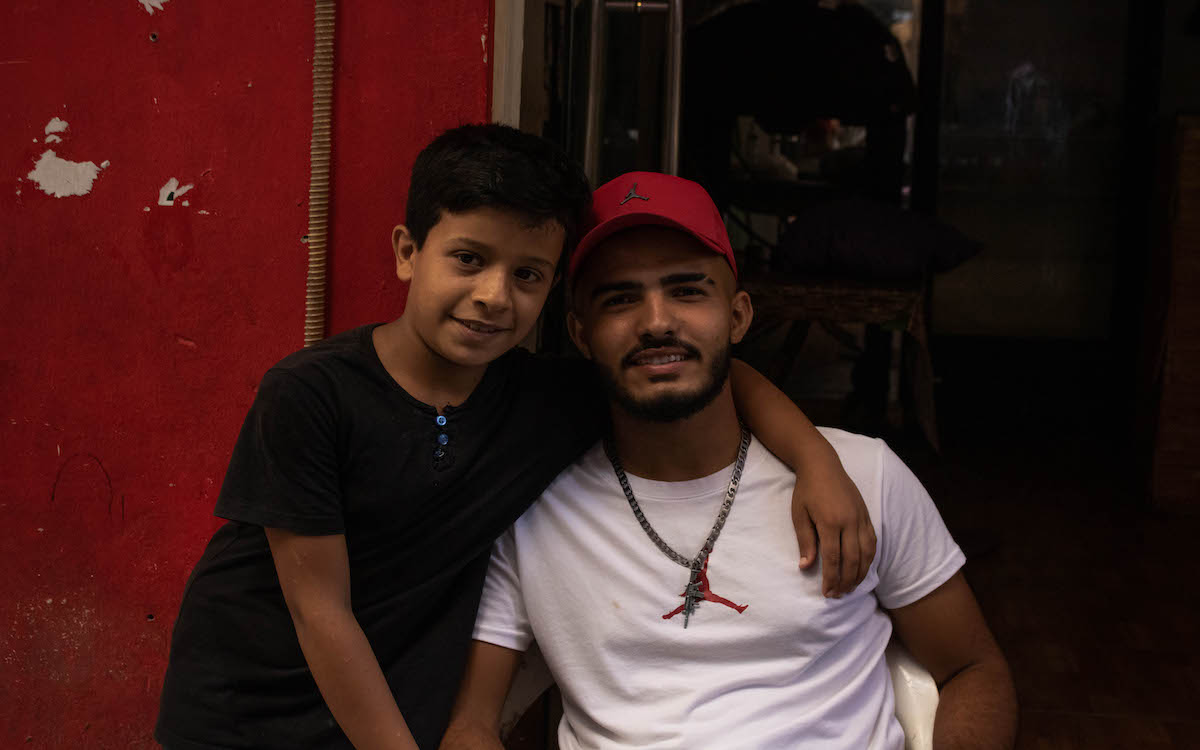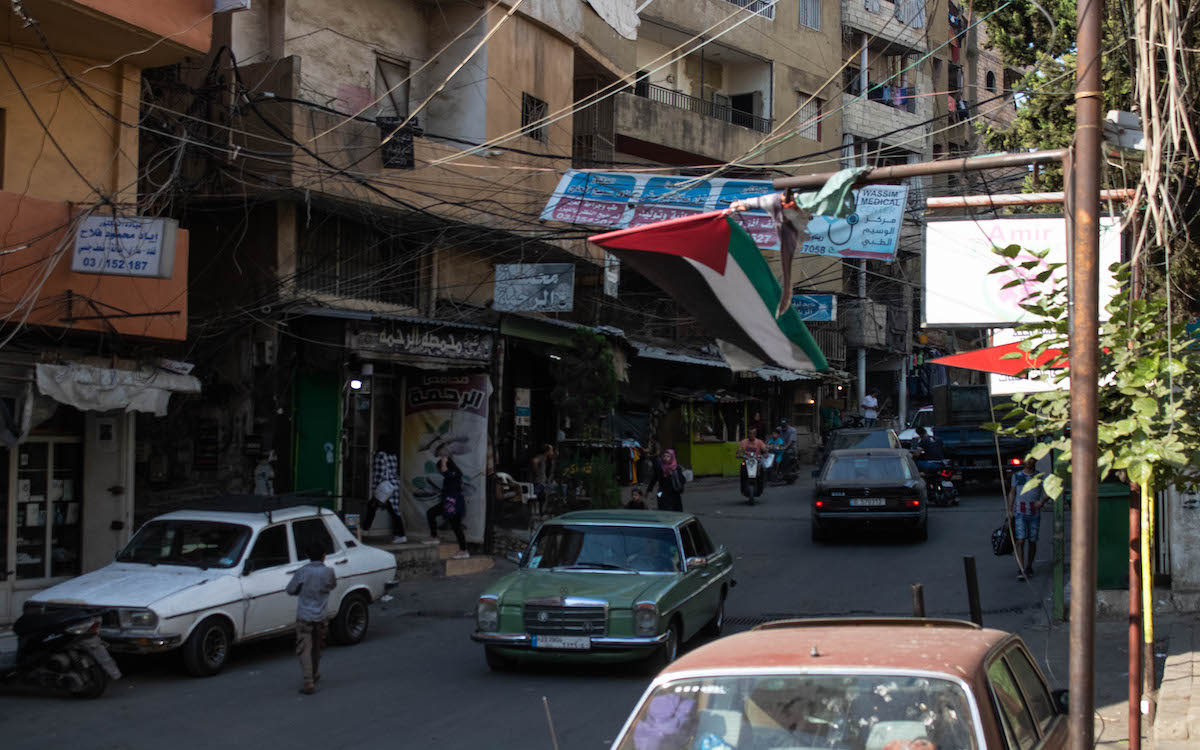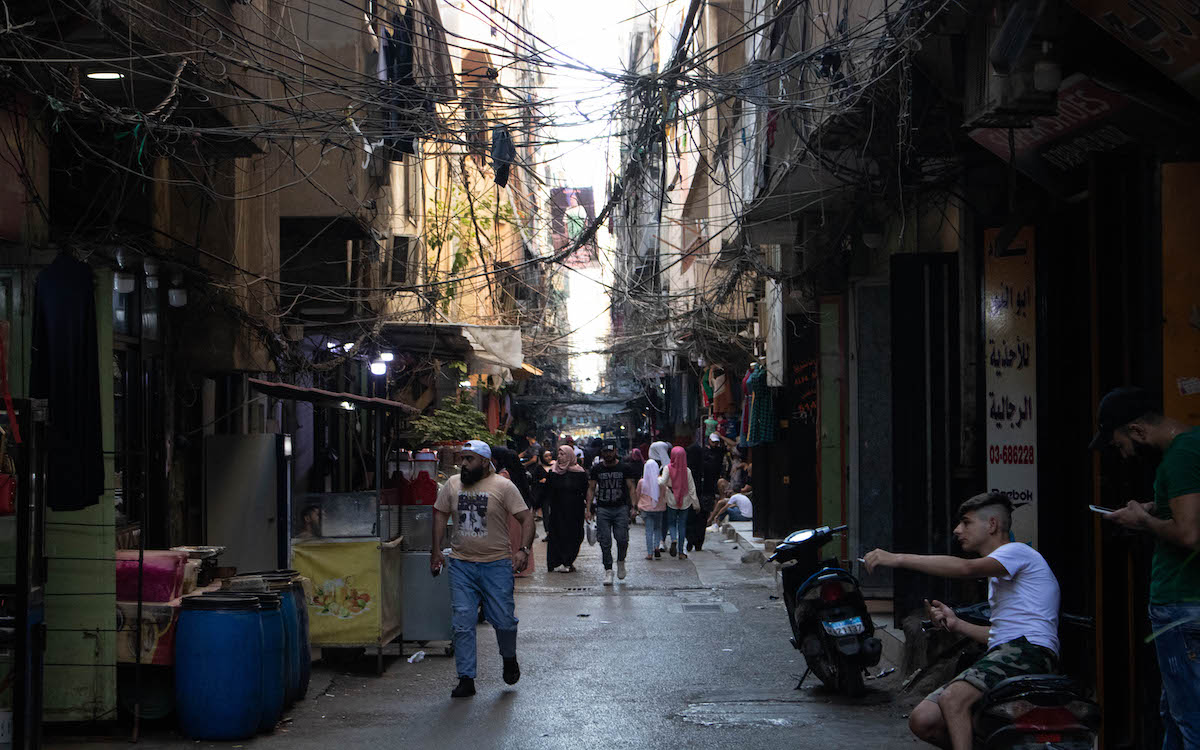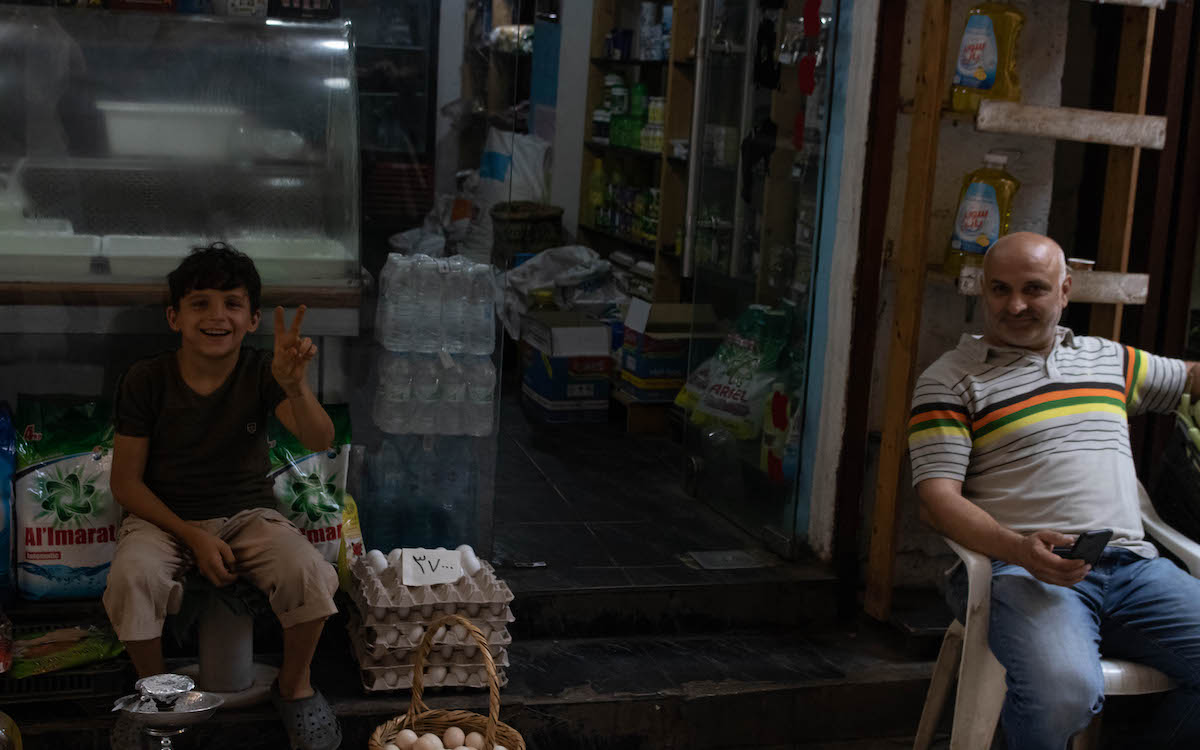
Several large trucks block the road. The young men manning the roadblock tell the oncoming cars to turn around.
Young children use all their strength to pull tires into the road for the protestors to burn.
On July 8, the Palestinian refugees in the Beddawi camp blocked its main road next to the Al Hilal Hospital in protest against the massive hike in private power generator subscription fees, as well as the increase in rationing hours — nearly 8 hours per day without power.
Since the beginning of the fuel crisis in Lebanon two months ago, a version of this scenario has happened nearly every day on the Beddawi sea road, in the northern city of Tripoli.
Inside the camp, survival follows much harsher laws than in the rest of Tripoli, which has been deemed Lebanon’s poorest city.
While some express their anger in the streets, most residents of the camp walk the city within a city, resting on the side of the road, exhausted from the summer heat, worrying about what food they can put on the table the next day.
Power is scarce since the fuel crisis has left generators empty. They only have a few hours of electricity a day. Prices for basic necessities are rising daily.
“It is basically a prison. A small prison,” 26-year-old Mohammad Bashir said of life in the camp.

A poor city within a poor city
The Palestinian camps in Lebanon “are like cities within the city, with their own routines full of challenges and needs,” a 2015 report by the International Federation of Red Cross and Red Crescent read.
Beddawi, just like the other 11 Palestinian refugee camps in Lebanon, was set up after thousands of Palestinians left their homes behind during the Nakba in 1948. Over 70 years and several generations later, they are still there, with the number of people residing in the camps growing into the tens of thousands, while the area remains the same.
Architect and urban planner Elie Khoury told NOW that it is not surprising that the once informal camps became independent communities with their own economies and societies since they receive little to no help from the Lebanese government. International aid from either the UN or NGOs is contingent on a constantly fluctuating budget.
“The camps start making their own infrastructure like anywhere else in the world,” Khoury explained. “They have their phones, electricity and all of the things. All of the normal things become present there.”
But because of the problems that Palestinians have had with the Lebanese government over the decades, and the wars that have been fought in Lebanon, they have become increasingly isolated. “They’ve become ghettos”, Khoury said.
In 1969, the Cairo agreement between Yasser Arafat and the Lebanese government allowed for the Palestinian guerillas to exist in the camps under the management of Lebanese authorities. The groups quickly imported arms from Syria, leading to clashes between the groups and the Lebanese army.
This led to the camps becoming bases for the armed groups, as well as residential areas for Palestinian refugees.
“It came to be as a fortress space for fighters against the Lebanese government because they do not trust the Lebanese government and to make their own society,” Khoury said. “They don’t trust anybody.”
“You can study at the university but it doesn’t matter. You won’t find work,” Zeit explained. “If you study engineering, you won’t find work as an engineer. Lebanese people can’t even find work!”
The conversion of the camps into “fortresses” for the Palestinian armed groups and the security concerns further isolated the camps’ residents from Lebanese society.
After decades of conflict between the Palestinian groups and the Lebanese security forces, Lebanese authorities are no longer able to enter the camps.
“They are not trusting the Lebanese security. So they stay isolated from the Lebanese society,” Khoury stated. “They are not confident in the Lebanese people and army.”
According to Fatah’s regional representative in north Lebanon, Abu Jihad Fayyad, the group handles “activities like security in the camp as well as applying for assistance.”
“Most of the aid that comes to the camp comes from Palestinians who have traveled abroad.”
Fayyad explained that while they apply for aid, it often comes sparingly, usually in the form of a small cash donation or boxes of food that are then distributed throughout the camp but do not last long enough to make a significant impact in the lives of the camp residents.
“Life in the camp is like in all of Lebanon,” Fayyad said. “If there is no electricity, then there is no electricity for hours. There is the gas crisis. For Lebanese, the situation is hard. For Palestinians in the camp it is very hard.”


An overcrowded ghetto
Primarily, the camp relies on aid provided by the United Nations Relief and Works Agency (UNRWA), but the amount of help that comes from the UN agency fluctuates and is contingent on it having the proper funding, and UNRWA hasn’t had the proper funding in a long time. In July, the office in Sidon, South Lebanon closed its doors in protest because it has no more means to help refugees. The situation is not much different in the North.
The economic crisis has made life harder in the camp, especially as its population has grown extensively over the past few years.
In 2007, when the Nahr El-Bared camp was destroyed amid fighting between the Lebanese security forces and Fatah Al-Islam, many of the camp’s residents relocated to Beddawi, causing the population to nearly double to 30,000 almost overnight.
After 2011, the Syrian civil war has also added more strain to the camp as some Syrians looking to escape the war sought refuge there. According to UNRWA’s estimates, around 30,ooo Palestinian refugees from throughout Syria were quick to follow suit and flee to Lebanon. Now, twice displaced, they settled in Beddawi.
UNRWA spokesperson for Lebanon, Huda Samra, recalled how cramped the streets of the camp became after its population increased so significantly.
“You couldn’t even walk in the streets,” she told NOW. “This posed an additional strain on the water network, on the infrastructure, on the garbage, overcrowding, on the economy of the camp, on poverty, everything.”
The situation in the camp only eased a little after some of those that first came to Bedawi went to other parts of Lebanon, clearing up some space in the camp and giving UNRWA the chance to try to improve their services and adjust their aid in accordance with the new population in the camp.
Dependent on aid
UNRWA, the UN agency in charge of providing aid for Palestinian refugees, has never known a time when funding issues haven’t made its activities challenging.
“So far we have been able to maintain all of our services uninterrupted which is a blessing,” Samra said. “What we have not been able to do is increase our assistance to the refugees because of the rapidly increasing needs of the community.”
UNRWA helps provide cash assistance to the poorest in the camps as well as education at their primary, secondary and vocational schools. It also provides medical assistance through their health centers, including helping cover some of the refugees’ medical expenses. The Covid-19 pandemic and the economic crisis have made continuing these services a challenge.
In 2018, then-US President Donald Trump suspended funding to UNRWA, drastically slashing their annual budget until President Joe Biden resumed the funding in April 2021.
“Life in the camp is like in all of Lebanon,” Fatah’s Abu Jihad Fayyad said. “If there is no electricity, then there is no electricity for hours. There is the gas crisis. For Lebanese, the situation is hard. For Palestinians in the camp it is very hard.”
Despite this, the organization is still running on around a $150m deficit, forcing it to raise funds to continue providing their normal services and give the refugees what they need the most. Cash.
“What they need is cash assistance. Many, many refugees are struggling to put food on the table,” Samra said. “They used to work the whole day for 30,000 lira to 50,000 lira if they were lucky. Now, with 50,000 lira, you can barely bring bread or one pack of cheese.”
The UNRWA aid is the only source of income for many Palestinian households. Long before the crisis, the jobs available to Palestinians were limited due to a Lebanese law permitting them to work only as foreigners. Only nursing and private sector jobs, if they receive a work permit, are available. Many work illegally and are underpaid.
“We, as Palestinians, are an oppressed people,” Bashir stated. “We have been oppressed for a very long time. From the moment that we came here, we didn’t have rights.”
Now, with the economic crisis holding a tight grip on the country, not many companies are hiring or willing to sponsor foreigners to work for them. Even the permits themselves are too costly for those residing in the camp, as the money that they would spend on the application could go towards food for a week.
“If they want to apply for one, then they need to pay 50,000 lira,” Bashir stated, a tinge of anger in his voice. “50,000 lira is now like $2! How is a man supposed to feed his children? Where will he get things for his daughter? Milk for his son and baby? Food, drinks, bread, where is a man supposed to get these things?”
Samra said that UNRWA is currently preparing to roll out direct cash assistance to the neediest in the camp, specifically those with children, giving the families $40 per child, per month.
While it will help those that receive the money, it still does not solve the high unemployment rate. Dependence on aid perpetuates poverty.
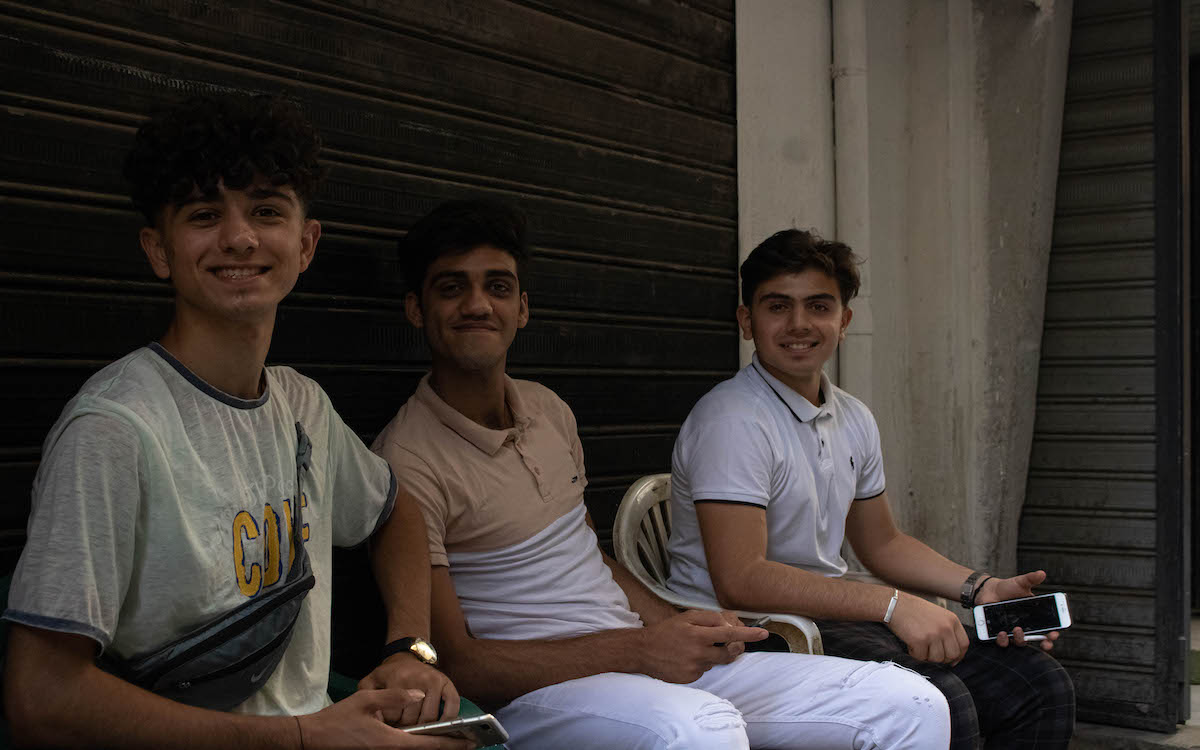

The dream of leaving
Many in the camp are unable to find jobs and those who do, work long and hard hours to make sure that they can provide for their families.
Dib Zeit, 40, opened a small sandwich shop just before the coronavirus pandemic reached Lebanon.
“You work from the early morning until the late evening just to provide for your children,” Zeit told NOW. “There is no alternative to this. The work is bad, but there is no alternative.”
Many of the younger Palestinians in the camp hope that graduating from university will make it easier for them to find a job afterward. But they are quick to discover that there are few opportunities for them outside of the confines of the camp unless they go abroad.
“You can study at the university but it doesn’t matter. You won’t find work,” Zeit explained. “If you study engineering, you won’t find work as an engineer. Lebanese people can’t even find work!”
Zeit sees emigration as the only way to have a better life. He is pushing his three boys to do well in school so that they are able to find a scholarship out of Lebanon.
“It’s so hard. It’s very hard,” Zeit said. “Not just a little. Anyone that tells you otherwise is a liar. How can you get married? How can you have a future? There isn’t one!”
Bashir, like many others of his age, is trying to leave Lebanon. But that could require him to get smuggled out of the country illegally, by boat.
Since Bashir is a Palestinian residing in Lebanon, he only has Palestinian refugee documents which makes it nearly impossible for him, and others like him, to get a visa or to find resettlement in another country. Others are even less lucky. Their parents never register them so they do not have papers.
“We have to take the illegal route because it is very hard for Palestinians to get resettled the legal way,” he said. “It’s really hard to get a visa. I applied to Germany nine years ago and there still has been no answer.”
One of the things holding him back from trying to get smuggled out of the country is the fact that he knows people who have died trying to leave.
“He tried to leave with a smuggler,” he recalled of someone from the camp he knew who tried to get smuggled to Europe. “He went through the desert and it was so hot. The sun hit him and he died. His parents couldn’t get his body. He’s still buried in that desert.”
Nicholas Frakes is a multimedia journalist with @NOW_leb. He tweets @nicfrakesjourno.
Rayanne Tawil contributed reporting.




